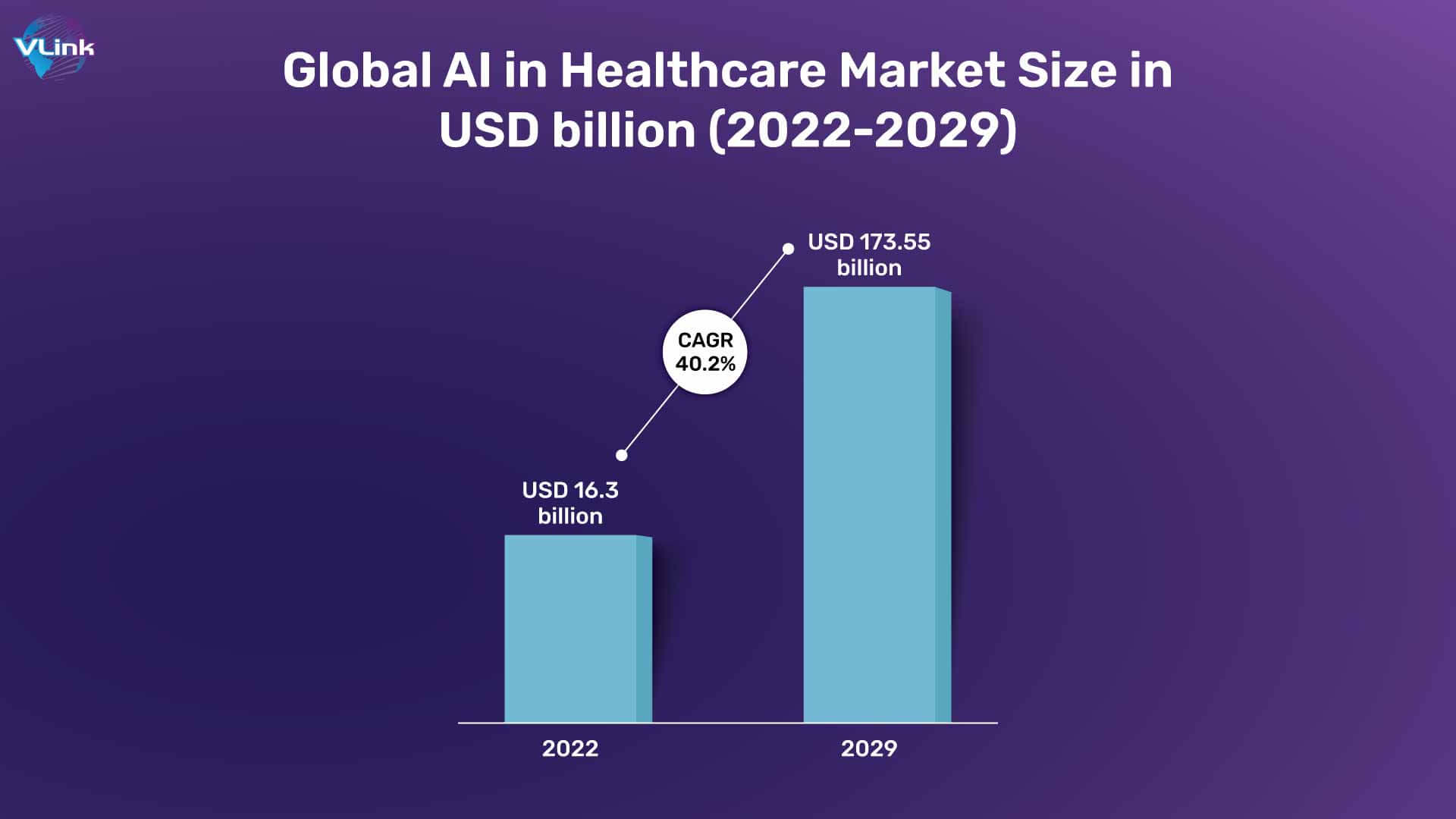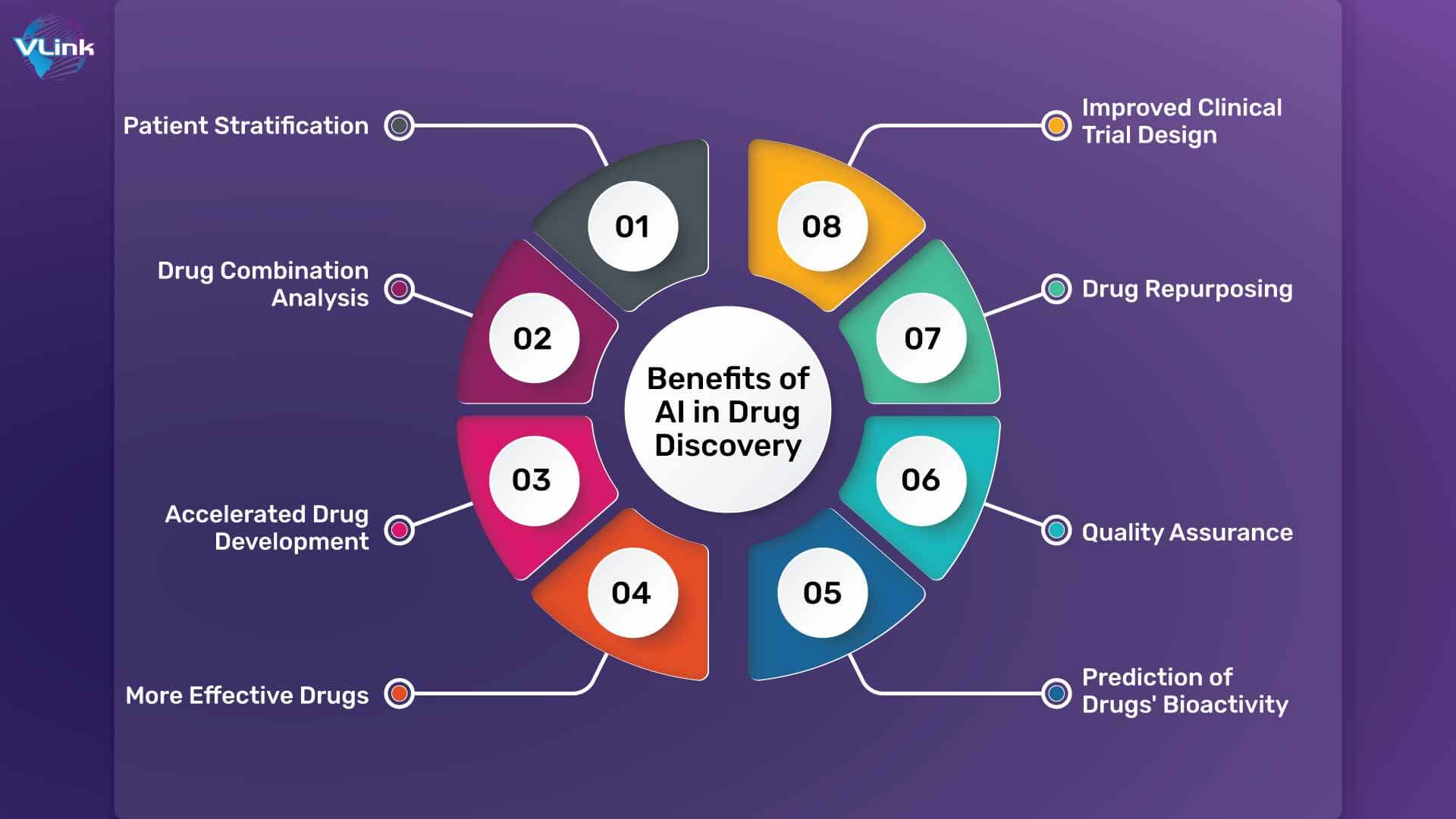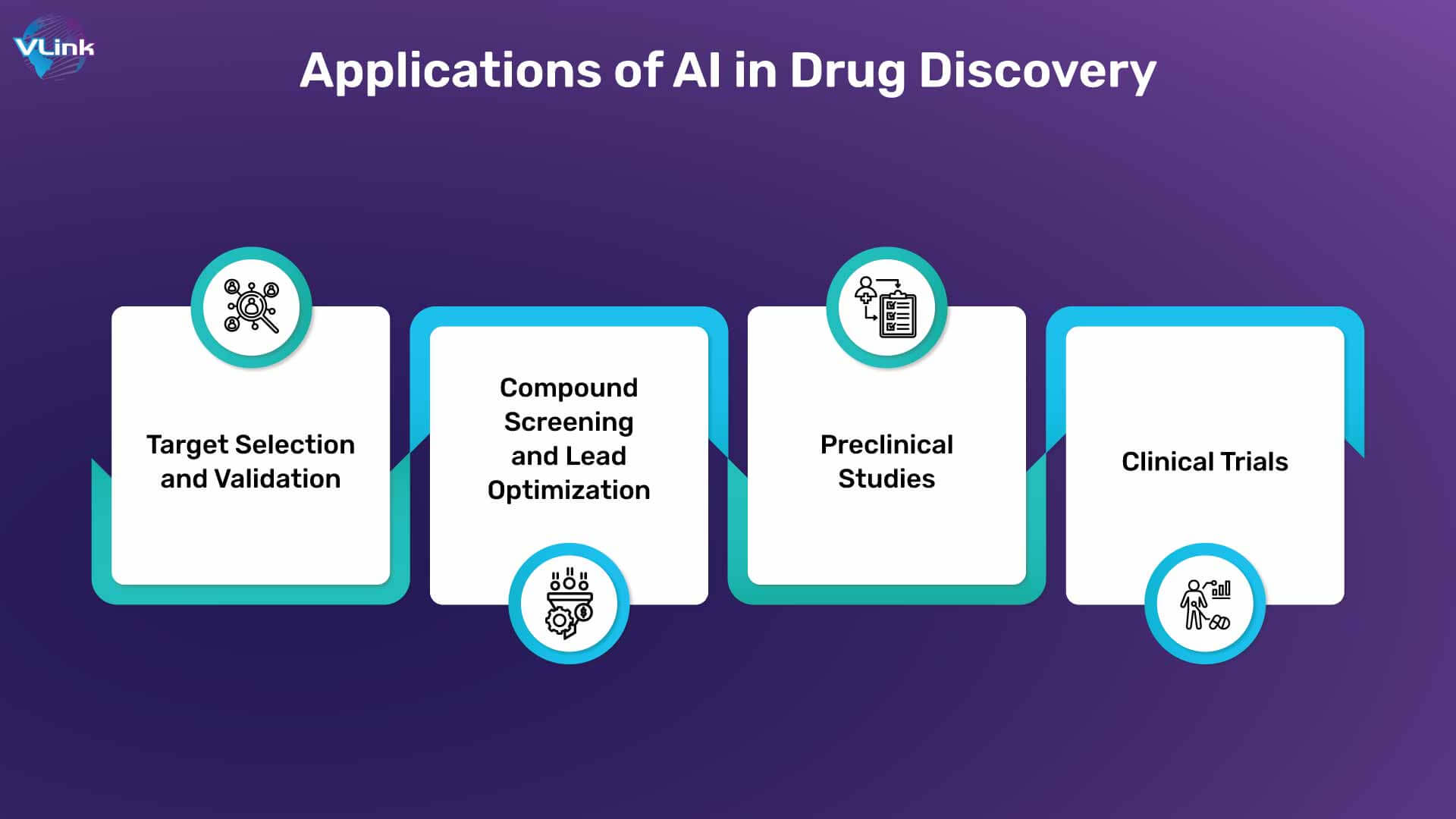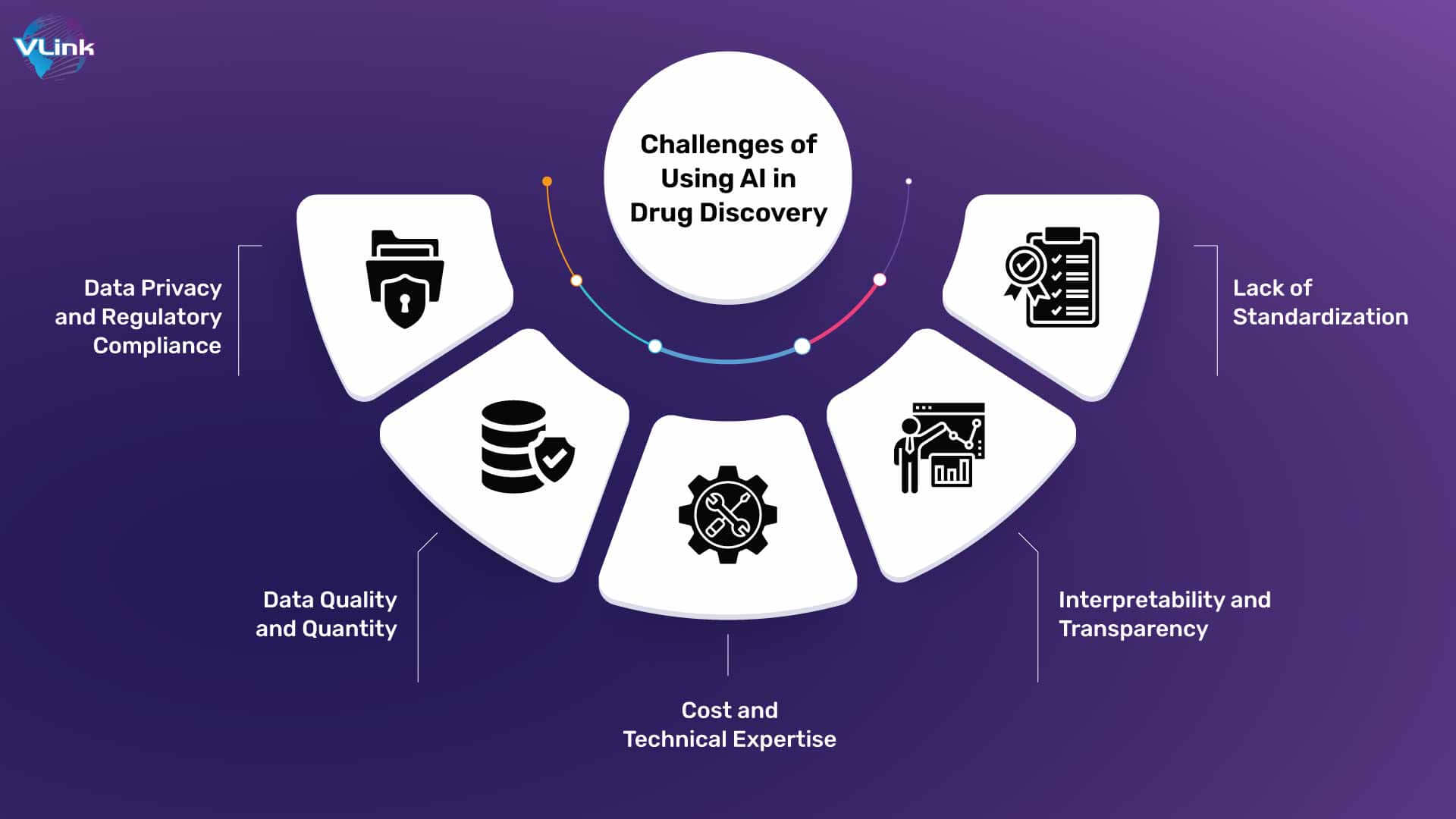Artificial intelligence (AI) has emerged as a promising solution with significant potential to revolutionize drug discovery and development. The global AI in healthcare market, valued at USD 16.3 billion in 2022, is projected to grow at a CAGR of 40.2%, reaching USD 173.55 billion by 2029.

AI facilitates optimal drug candidate identification, offers unprecedented insights into various diseases, and efficiently manages extensive patient datasets. These capabilities are instigating transformative changes across the pharmaceutical landscape.
According to McKinsey, integrating AI capabilities into big data strategies can generate an annual value of up to $100 billion within the US healthcare system. It involves utilizing predictive modeling and thoroughly analyzing sensor data.
In addition, joint research by Carnegie Mellon University and a prominent German institution emphasized that AI in drug discovery significantly lowers drug discovery expenses, suggesting potential cost reductions of up to 70%.
This blog explores the impact of artificial intelligence in drug discovery and development and how advanced AI techniques revolutionize healthcare.
Benefits of AI in Drug Discovery

AI-driven drug discovery demonstrates its significance in categorizing patients by effectively identifying distinct groups of individuals with similar disease profiles and characteristics.
By leveraging predictive modeling and biomarker identification, AI empowers healthcare providers to tailor treatment approaches. It results in an increased success rate in drug development and ultimately enhances patient outcomes.
The powerful analytical capabilities of AI are pivotal in scrutinizing intricate diseases that might require multiple drugs. AI plays a crucial role in developing more effective treatment strategies by forecasting collaborative effects and identifying optimal dosages for different drug combinations.
In addition, AI tailors drug combinations for individual patients by considering their genetic and molecular characteristics, ultimately enhancing treatment effectiveness and improving patient outcomes.
The incorporation of artificial intelligence into drug discovery expedites the identification of potential drug targets significantly. Utilizing machine learning algorithms, extensive datasets can be rapidly analyzed, leading to the swift discovery of potential drug candidates.
This acceleration optimizes the lead discovery process, leading to significant time and resource savings for researchers and pharmaceutical companies in the end.
Artificial intelligence is integral to drug discovery and development, playing a vital role in predicting the pharmacological properties of lead molecules by analyzing their chemical structure. This application enhances the effectiveness of drug development.
Using machine learning algorithms, researchers can construct predictive models to estimate crucial properties such as solubility, bioavailability, and toxicity. These models guide the design of new molecules, improving their pharmacological characteristics and enhancing the efficiency and safety of potential drug candidates.
AI plays a significant role in improving the design of clinical trials. AI analyzes electronic medical records and patient data by efficiently identifying suitable candidates and enhancing patient recruitment. In addition, AI contributes to optimizing trial designs by pinpointing patient subgroups with a higher likelihood of responding positively to specific treatments.
The integration of AI-driven wearable devices enables real-time monitoring, ensuring precise data collection and necessary adjustments to trial protocols to enhance patient safety. Furthermore, AI algorithms facilitate rigorous data analysis, providing valuable insights for future research and clinical practices.
AI presents a promising approach to discovering new therapeutic applications for existing drugs. It significantly reduces the time and costs associated with traditional drug development and enables the identification of potential new uses for established medications.
By analyzing extensive datasets containing information on drugs and diseases, AI algorithms can reveal patterns and relationships, paving the way for exploring novel therapeutic opportunities. Additionally, AI-driven network pharmacology allows for investigating intricate interactions between drugs, targets, and diseases, unlocking further potential for existing medications.
AI is vital in elevating the accuracy and efficiency of various quality assurance processes within drug quality control. Using computer vision algorithms for automated inspection, AI assists in promptly identifying defects, contamination, and packaging inconsistencies, ensuring compliance with stringent quality standards.
In addition, AI algorithms analyze sensor data from manufacturing equipment, enabling the implementation of predictive maintenance measures to preempt equipment failures and minimize production downtime.
AI contributes to fraud detection by scrutinizing sales and distribution data to identify suspicious patterns, thereby safeguarding the integrity and safety of drug distribution channels.
Artificial intelligence has transformed the way researchers predict the bioactivity of drugs in the realm of drug discovery and development. AI is now employed to anticipate the bioactivity of different compounds using methodologies such as quantitative structure-activity relationship (QSAR) modeling and molecular docking.
These approaches involve the analysis of the chemical structure of compounds and their interactions with target proteins, resulting in more precise predictions of their biological activity.
Through applying deep learning techniques, AI discerns intricate patterns and relationships within extensive datasets, facilitating accurate predictions of the bioactivity of untested compounds.
Application of AI in Drug Discovery

AI-driven drug discovery streamlines identifying and validating potential molecular targets by analyzing diverse datasets, encompassing Drug Information Banks and public libraries. Employing techniques like deep autoencoder, relief algorithms, and binary classification, AI-based drug discovery effectively prioritizes these targets.
Furthermore, AI platforms leverage graph-convolutional networks and computer vision models trained on cryo-EM microscope data to comprehend protein structures.
In compound screening, the application of AI-driven virtual screening allows for the practical identification of potential lead molecules from vast compound databases. The automated AI Retrosynthesis Pathway Prediction significantly improves the planning process for chemical syntheses.
Additionally, AI-based drug discovery models play a pivotal role in classifying cell targets and enable intelligent image-activated cell sorting, leading to a more efficient separation of cells.
AI is essential in understanding the molecular mechanisms of action and forecasting dose-response relationships in pharmacokinetic/pharmacodynamic modeling. It efficiently simplifies toxicology assessments using the Deeptox Algorithm, providing accurate predictions of compound toxicity.
Additionally, deep learning algorithms leverage transcriptomic data to make precise predictions regarding pharmacological properties.
AI tools play a crucial role in clinical trials by enhancing key aspects. They contribute to identifying patient diseases, pinpointing specific gene targets, and predicting molecular effects. In addition, AI-driven applications improve medication adherence and facilitate risk-based monitoring, increasing efficiency and success rates in clinical trials.
Real-World AI Drug Discovery Examples
Numerous notable case studies have highlighted AI applications in drug discovery, underscoring the successful integration of AI methodologies. Some noteworthy examples of AI-driven drug discovery include:
- Cancer Treatment Compound Discovery
- MEK Protein Inhibitor Identification
- Alzheimer's Disease Therapeutic Targeting
- Novel Antibiotic Discovery
- COVID-19 Therapeutic Research
Challenges of Using AI in Drug Discovery

The sensitive nature of patient data raises concerns about data privacy and compliance with regulations. Adhering to stringent data protection rules, such as the US Health Insurance Portability and Accountability Act (HIPAA) and the General Data Protection Regulation (GDPR) in the European Union, is essential to address ethical and legal considerations in AI-driven drug discovery.
The efficacy of AI is heavily contingent on the accessibility of high-quality data. In the context of drug discovery, though, the data landscape frequently presents challenges characterized by its scarcity, diverse nature, and varying quality. These attributes create obstacles for AI systems in precisely analyzing and modeling this data.
Integrating AI in drug discovery demands substantial investments in financial resources and technical expertise. It entails setting up and sustaining the required infrastructure and recruiting proficient data scientists and AI experts. In addition, these prerequisites represent a significant commitment, presenting a challenge for widespread adoption.
The intricacy of AI models frequently poses challenges related to interpretability and transparency. Building trust and confidence necessitates a comprehensive understanding of these models' underlying mechanisms and decision-making processes. This comprehension, in turn, fosters the broader adoption of AI in drug discovery.
The drug discovery domain encounters a notable challenge from the need for standardized data formats, collection methodologies, and analysis techniques. This lack of standardization complicates the effective comparison of studies and datasets. As a result, AI faces hurdles in generating consistent and reliable predictions and models.
Future of AI in Drug Discovery and Healthcare
The pharmaceutical and healthcare industry increasingly adopts AI solutions to alleviate the substantial financial burden and potential setbacks associated with traditional virtual screening (VS) methods. This shift in approach is evident in the remarkable growth of the AI market, which surged from $200 million in 2015 to $700 million in 2018.
Projections suggest a further increase to $5 billion by 2024, underscoring AI's transformative potential in reshaping the pharmaceutical and medical sectors. The anticipated 40% growth from 2017 to 2024 emphasizes the profound impact of AI on these domains.
Consider VLink for Healthcare Software Development with AI!
If you want to develop your healthcare software development with advanced AI techniques, contact VLink. Our team of experts is dedicated to delivering customized solutions that revolutionize the healthcare industry.
By contacting our dedicated team with experience developing machine learning & AI solutions, you can quickly get around these problems and make more accurate diagnoses, drug discoveries, and treatment plans.
Utilizing a dedicated development team of proficient experts, we have the capability to create innovative AI-driven solutions tailored to address the requirements and tackle the challenges encountered in the healthcare industry.
Frequently Asked Questions
AI for drug discovery monitors post-market safety by continuously analyzing real-world data, including patient records, adverse event reports, and medical literature.
By employing advanced algorithms, AI detects potential safety issues, identifies patterns, and assesses the long-term safety of drugs after market approval, contributing to enhanced post-market surveillance and patient safety.
AI accelerates drug discovery by analyzing vast datasets, predicting drug properties, and optimizing trial designs. This efficiency reduces research costs and shortens development timelines. AI streamlines target identification, lead optimization, and clinical trial processes, enabling more cost-effective and rapid drug discovery, ultimately benefiting pharmaceutical companies and patients.
AI is utilized in drug discovery for target identification, lead optimization, and clinical trial design. It analyzes vast datasets to predict drug properties, identifies potential drug targets, and accelerates overall drug development, contributing to more efficient and effective drug discovery.














